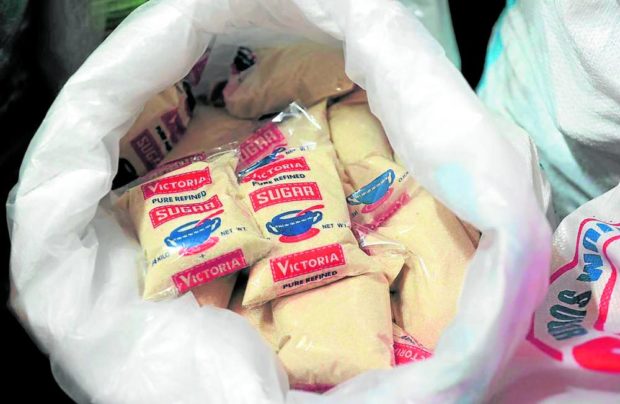Peasant groups score DA’s ‘default solution’ to agricultural problems

PRICEY COMMODITY | Retailers sell repacked washed sugar at Tandang Sora Public Market in Quezon City in this file photo. (INQUIRER FILE PHOTO)
MANILA, Philippines — Instead of resorting to importation as its default solution to agricultural problems, the Department of Agriculture (DA) should “decisively address” the steep cost of producing sugar and other factors affecting high sugar prices, according to peasant groups.
The Kilusang Magbubukid ng Pilipinas (KMP) described as an “economic misstep” the DA decision to import another 64,050 metric tons of refined sugar that will only aggravate the problem it seeks to solve.
“DA should change its name to Department of “Angkat” (Imports, in Filipino) as it knows only importation as the default solution to all problems,” Danilo Ramos, chair of KMP, said in a statement on Friday.
According to KMP, September marks the start of the milling season in the sugar industry, which also signals the beginning of a new crop year.
For the incoming milling season, the crop year is set from Sept. 1 to Aug. 31, 2023, as set by the Sugar Regulatory Administration, the group said.
Article continues after this advertisement“Sugarcane milling season is at its peak from November to December. Why import during the milling season? Who decided on this and for whose benefit?” asked Ramos.
Article continues after this advertisementImports won’t lower prices
KMP stressed that more sugar imports will not reduce the prices of sugar and reiterated “the need to further lower the cost of fuel, fertilizer, truck parts and equipment, among others that are involved in the sugar production chain.”
To address inflation in sugar, KMP suggested strengthening and increasing local production, as well as supporting farmers and planters.
The KMP noted that in the past decade, lands devoted to sugar production have dropped from 423,000 hectares to 399,000 hectares as a result of land-use conversion.
The Negros region, which produces about 60 percent of the country’s total sugar output, houses 13 sugar mills and six refineries.
The National Federation of Sugar Workers (NFSW) also opposed the importation, as sugar supply is “sufficient at the moment for domestic consumption.”
High cost of fuel
John Milton Lozande, secretary general of NFSW, said fertilizer prices were at P3,000 per sack when it used to be only from P800 to P920 per sack, while the price of fuel has more than doubled since last year.
One needs at least 18 sacks per hectare to have a good harvest of sugarcane, according to NFSW. The group also urged the government “not only strictly monitor compliance with minimum wage standards but also agree to a higher minimum wage for sugar workers, both in the field and in mills and refineries.”
In Negros Occidental, said the group, the daily wage for cutting and loading sugarcane is only from P280 to P350 per day, lower than the minimum wage in the region of P410 per day.